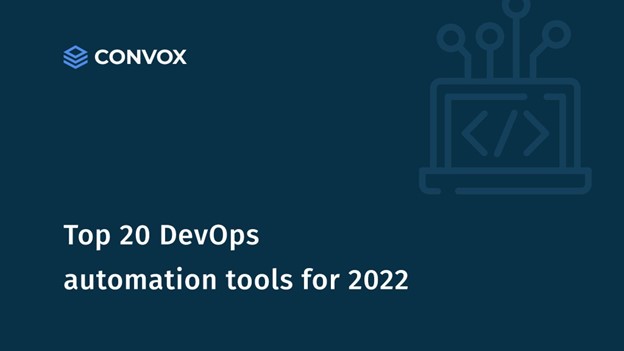
Contrary to the swiss army knife that people often assume DevOps to represent, DevOps is not a tool but a culture that streamlines collaboration between software development and IT operations teams. DevOps leverages automation to accelerate software release cycles, enabling teams to deploy new changes to users faster.
The DevOps approach is in harmony with agile methodologies aiming to boost team productivity. The critical components of a DevOps approach include leveraging automation and continuity to deliver top-quality software releases.
To facilitate a DevOps culture, various tools are specialized to serve multiple parts of the DevOps pipeline - build, management, testing, deployment, and monitoring, to automation and incident tracking.
This post will explore the Top 20 DevOps Automation Tools of 2023 poised to accelerate your CI/CD pipelines efficiently.
What are DevOps Automation Tools?
DevOps automation tools help organizations streamline their SDLC (Software Development Life Cycle) by leveraging automation to deploy modern applications faster. These innovative tools offer advanced features such as fast feedback loops between Dev and IT Ops teams, so new features or updates are accelerated to the production environment.
In addition, these tools automate repetitive manual tasks and help engineers manage complex environments at scale for better efficiency. They also help to detect security threats and runtime errors quickly. Ultimately, DevOps automation tools save time, boost productivity, minimize human error and deliver high-quality results.
Automation, DevOps tools, and efficiency
Popular DevOps practices include automated provisioning, building, testing, and deployment. An efficient DevOps pipeline relies on specialized tools, a collaborative team culture incorporating continuous feedback loops and precise logging, and automation when and where possible.
Here’s how CIOs can intentionally implement these elements to boost efficiency:
- Automate wherever you can
The key to a thriving DevOps culture is accuracy and speed - the main objective of automation tools. Faster, top-quality and flexible DevOps is about automating manual, repetitive tasks, minimizing human error, and boosting team productivity. Organizations can leverage automation tools for DevOps to securely deploy applications faster, scale workflows, and continuously release new updates with minimal human effort.
- Integrate everything
Managing toolset integration within a company can be overwhelming, especially at scale. To resolve this, use application-agnostic DevOps automation tools that act as a unified console and seamlessly manage your entire environment. These tools can connect to any application offering an API or a web service, regardless of source, device, destination, etc.
- Abolish siloed environments
Traditional software development culture had developer and operations teams working in siloed groups that often did not share the same tools, processes, and resources. Migrating to a DevOps culture can challenge these siloed teams to be more agile, flexible, and faster in delivering results. Here, DevOps automation tools are vital in streamlining cross-functional planning and abolishing siloed groups. This allows for better collaboration between Dev and IT Ops, rather than working as independent groups.
- Leverage Cloud
DevOps tools and cloud computing go hand in hand if agility, flexibility, and scalability are what you’re looking for. Cloud platforms have a competitive edge over on-premises solutions, especially as clouds are continually upgraded to support new tools and technologies. In addition, cloud platforms also enable faster provisioning of cloud-based resources to test and update code and even cease cloud resources when not needed.
Top 20 DevOps Automation Tools of 2022
Deployment
1. Convox
Convox is an open-source, multi-cloud Platform-as-a-Service (PaaS) that teams use to automate and manage Kubernets-based deployments with zero downtime. It offers automated workflows, role-based access control, easy integrations, and complete visibility into systems, applications, and logs.
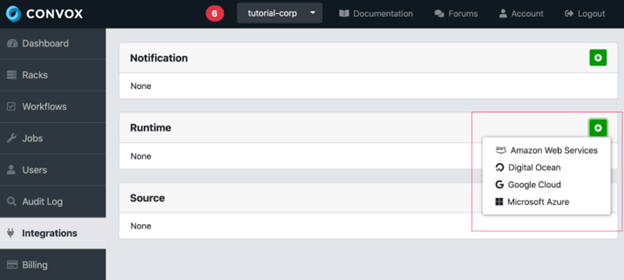
Source Code Management
2. Git
Git is a popular open-source software with a distributed SCM (Source Code Management) model that tracks code changes or any files that programmers work on. It maintains different versions of the source code during SDLC to retain data integrity, speed, and support for distributed processes.
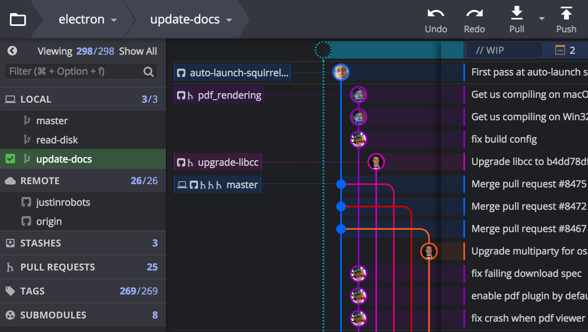
3. BitBucket
BitBucket is a Git-based source code repository hosting and collaboration service by Atlassian. With support for distributed version control, it offers seamless collaboration between teams throughout the SDLC. BitBucket integrates with Jira and Trello project management tools and has a built-in CI/CD functionality.
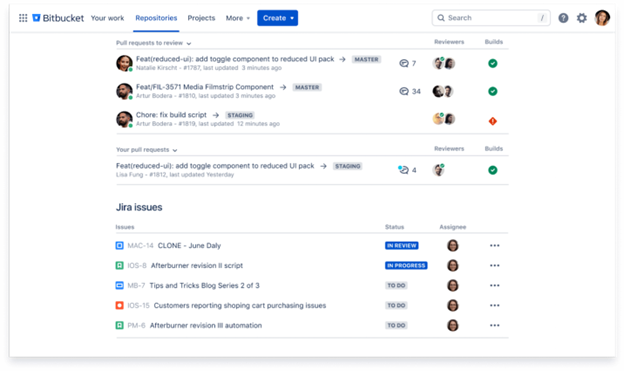
4. GitHub
GitHub is a code hosting platform for version control using Git. It is also a collaboration tool that helps you seamlessly collaborate with different teams and work on projects together from anywhere. GitHub offers source code management capabilities and a distributed version control of Git, along with its unique features.
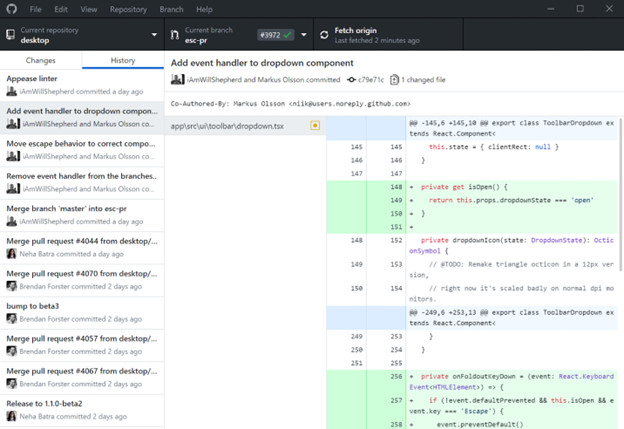
Infrastructure as Code Providers
5. Terraform
Terraform is an open-source cloud infrastructure provisioning tool. It enables Infrastructure as Code to help developers securely and predictably create, change and improve infrastructure using state files and execution plans.
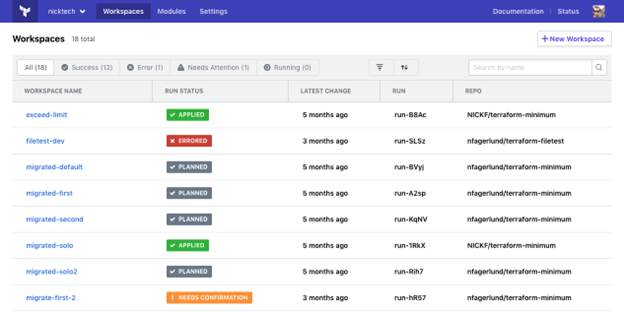
Configuration Management
6. Ansible
Ansible is an open-source software provisioning and agentless configuration management tool that promotes continuous delivery. It aids Infrastructure as Code and easily automates manual tasks such as intra-service orchestration, provisioning of cloud resources, and application deployment. Besides, it acts as a centralized console where developers can connect nodes and push modules. Ansible automatically runs these modules, discarding them after the process is complete.
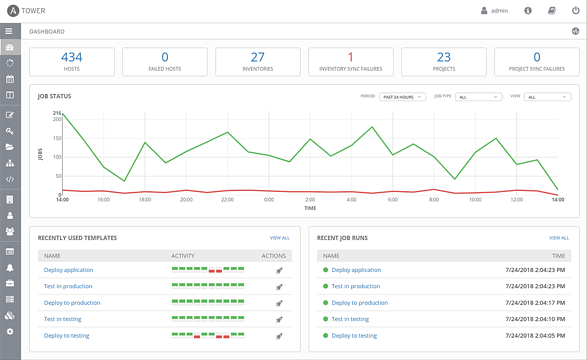
7. Chef
Chef is a DevOps automation tool for configuration management. It leverages Ruby programming language to write “recipes” of system configuration. It manages various types of nodes including network devices, cloud VMs, containers, servers and more. Chef also works with operating systems like mainframes, Linux, Windows and so on.
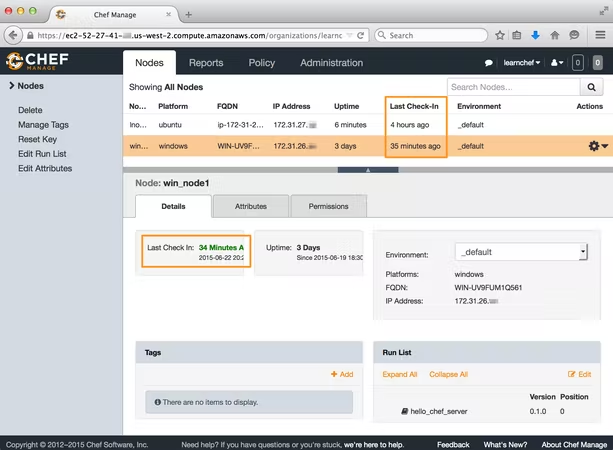
8. Puppet
Puppet is an open-source, cross-platform infrastructure automation tool that enables security and compliance. It has a unique declarative language to write system configurations and help to deploy and manage servers. Puppet is used on Windows and Linux to pull the strings on several servers simultaneously. Developers can use Puppet on Mac OS, Cisco switches, and even IBM mainframes.
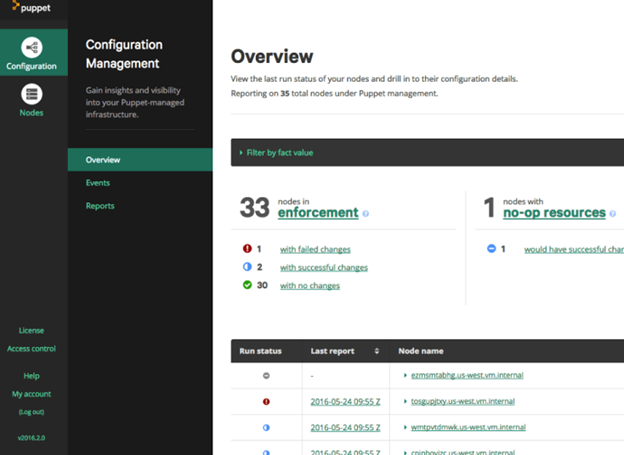
Containerization Platforms
9. Docker
Docker is an open-source platform based on Linux featuring a rich suite of DevOps tools. It helps developers build containerized environments for modern applications to enhance their security and portability while reducing the probability of bugs during tests. Here applications are independent of their operating systems and platforms. One can easily access containers via Docker Engine and run applications remotely.
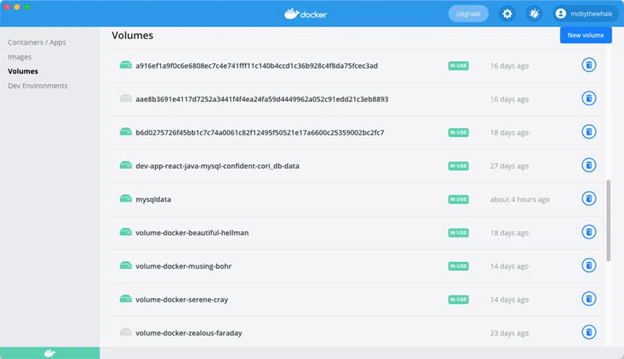
10. Containerd
Containerd is a DevOps tool used to manage the entire container lifecycle. It is offered as a daemon for Windows and Linux, and handles several elements from storage, network, and container image transfer to container execution and monitoring.
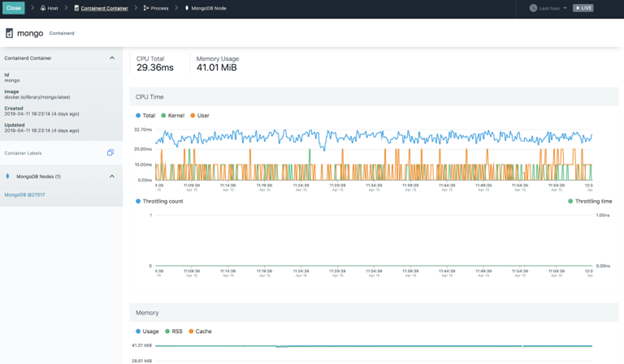
Container Orchestration Platform
11. Kubernetes
Kubernetes (also known as K8s) is a very popular, open-source container orchestration platform that automates deployment, management, and scaling within SDLC. It automates the management of many containers, as well as distribution and scheduling within a cluster to deploy containerized apps easily.
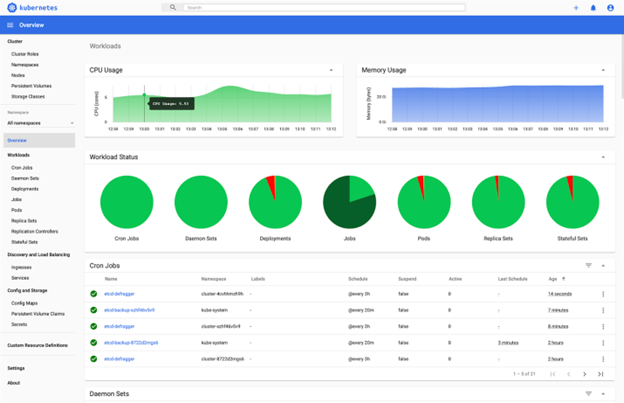
Application, Server and Network Performance Monitoring
12. Raygun
Raygun is a cloud-based network bug-tracking and monitoring tool with top-grade features for accurate crash reporting and monitoring capabilities. It is an ideal solution for medium and large-scale enterprises seeking a rich DevOps tool to detect performance issues. With deployment tracking, user tracking, monitoring, integrations, and crash reporting, Raygunis also able to trace back to unusual source code, API calls, or line functions.
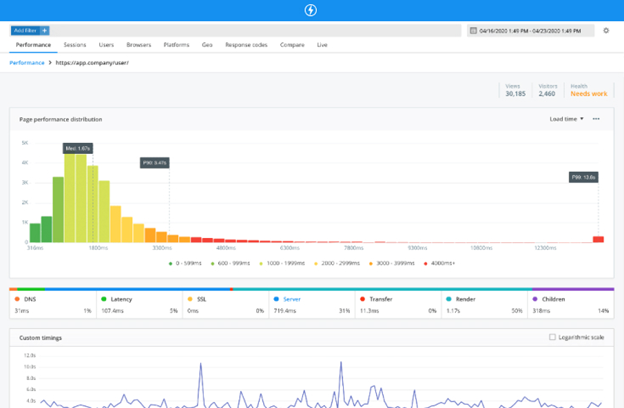
13. Nagios
Nagios is an open-source server monitoring and alerting software that monitors your network, systems, services, and entire infrastructure. It can monitor devices running on Linux, UNIX, Mac, and Windows operating systems. It timely executes security checks on crucial parameters of server resources, networks and applications. With over 5000+ add-ons, it closely monitors your servers.
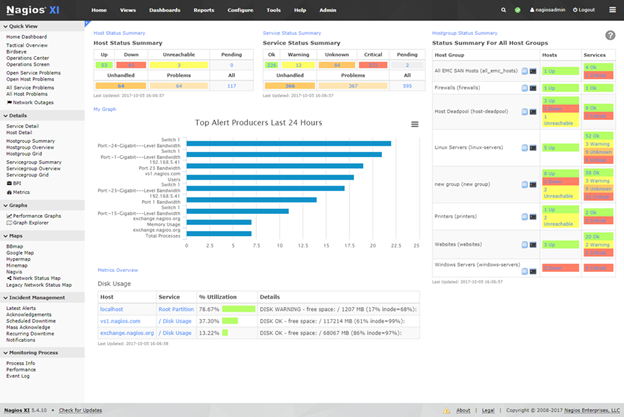
Log Monitoring and Log Management
14. Splunk
Splunk is a monitoring and searching tool that analyzes machine-generated big data in real time via a web interface. Additionally, it also checks the machine’s health to look for hardware failures. It systematically indexes information and correlates within a container to make it more searchable and accessible. With this, you can easily visualize data, create reports and generate alerts.
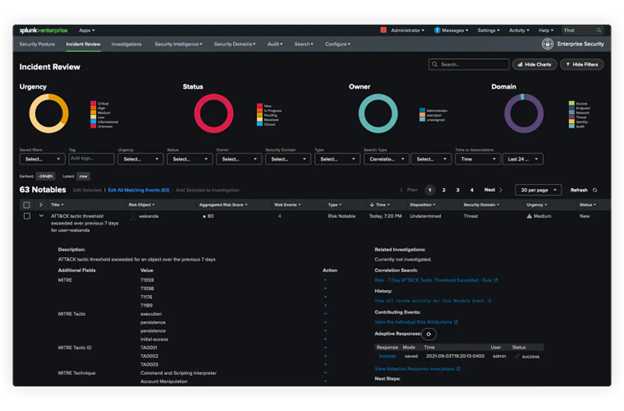
15. ELK
ELK stands for three open-source tools - Elasticsearch, Logstash, and Kibana. ELK stack helps enterprises aggregate logs from multiple applications and systems, analyze them, and build data visualizations for effective application monitoring and faster issue tracking.
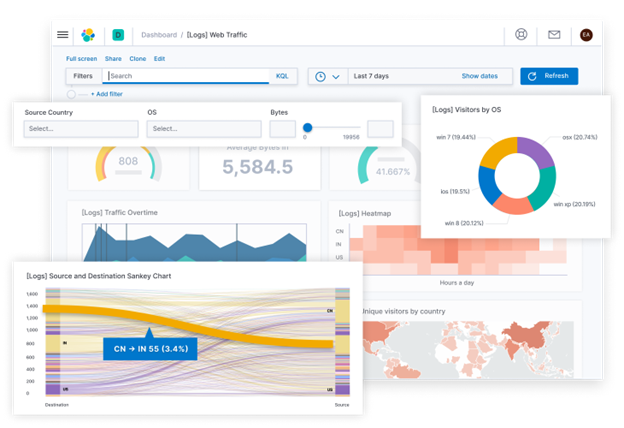
CI/CD Automation Tools
16. Jenkins
Jenkins is an open-source automation server that automates various elements of SDLC, including build, test, and deployment to facilitate CI/CD. It is a server-based, highly customizable tool that runs within servlet containers. Most DevOps tools can easily integrate with Jenkins thanks to its library of hundreds of plugins.
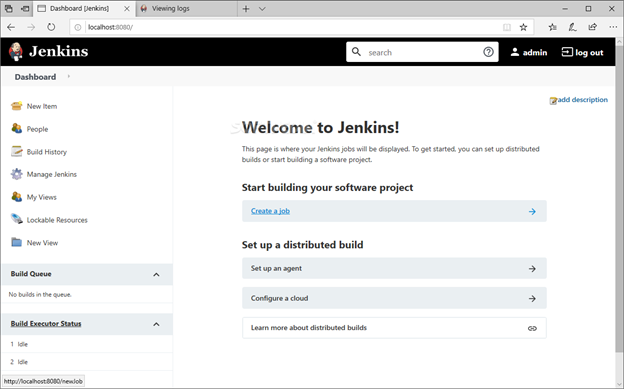
17. Bamboo
Bamboo is a CI (Continuous Integration) server that can create a CD (Continuous Delivery) pipeline by automating release management for your applications. Developed by Atlassian, Bamboo comes with various pre-built functionalities available out of the box.
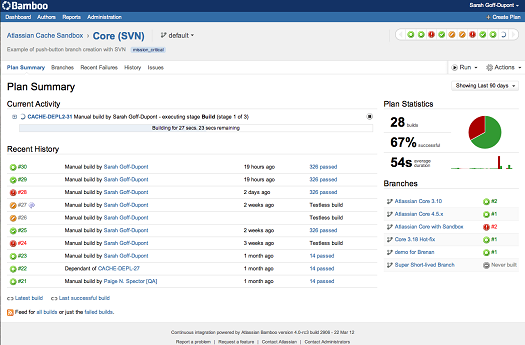
18. Buddy
Buddy is a self-hosted, web-based CI/CD tool for Git developers. It uses delivery pipelines to build, test and deploy applications and websites with code from Docker, GitHub, and BitBucket. It creates these pipelines using over 100+ drag and drop actions in a fully visualized UI.
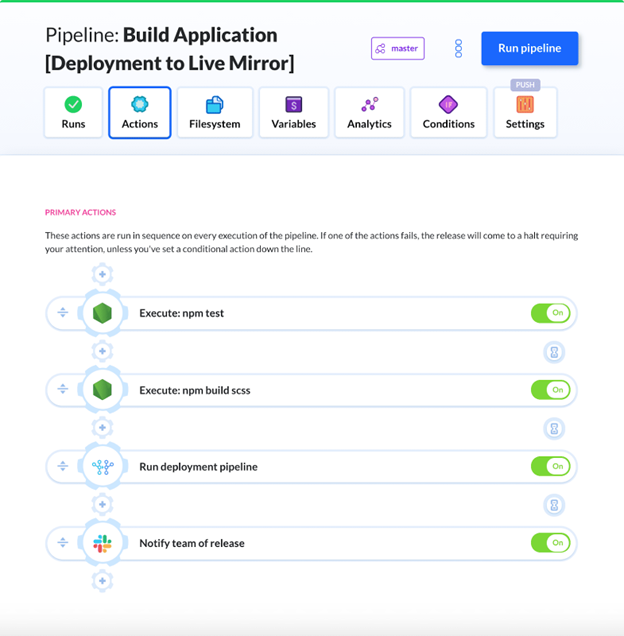
Build Automation Tool
19. Gradle
Gradle is a versatile build automation tool that helps you automate the building of multi-language software applications. It manages various parts of SDLC, including compilation, linking, code packaging, testing to deployment, and final release. It supports JavaScript, Java, C/C++, Python, and many more languages. Gradle has an extensive library of plugins, integrations, and a rich API.
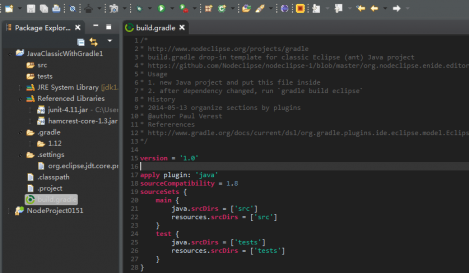
Browser Automation
20. SeleniumHQ
SeleniumHQ is an open-source tool for browser automation. It acts as a centralized interface where developers can write test scripts in different programming languages such as C#, Python, Ruby, PHP, Perl, Java, NodeJS, and so on. With Selenium, you can easily author functional tests across different web browsers, without the need to learn a test script language.
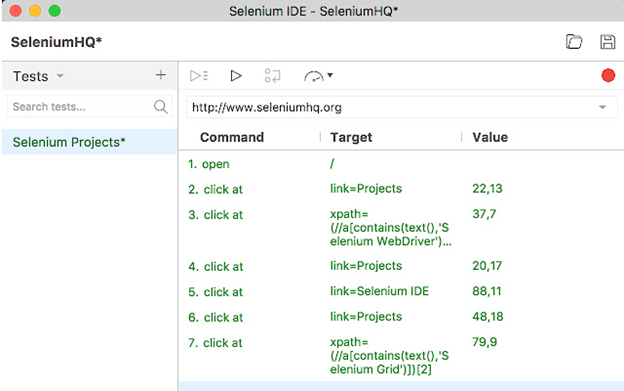
Conclusion
- DevOps automation tools are critical for the success of DevOps as they enable automation for source code management(including version control), resource provisioning, network configuration, server configuration, system monitoring, and even log management.
- Automating multiple DevOps tasks saves time and costs, as it automates manual repetitive tasks, reduces human error, accelerates SDLC, creates code consistency, and aids faster incident tracking.
- Top-class deployment tools like Convox can deploy and manage any application at scale. It aids CD (Continuous Delivery) by deploying from GitLab and GitHub and enabling Infrastructure as Code.

